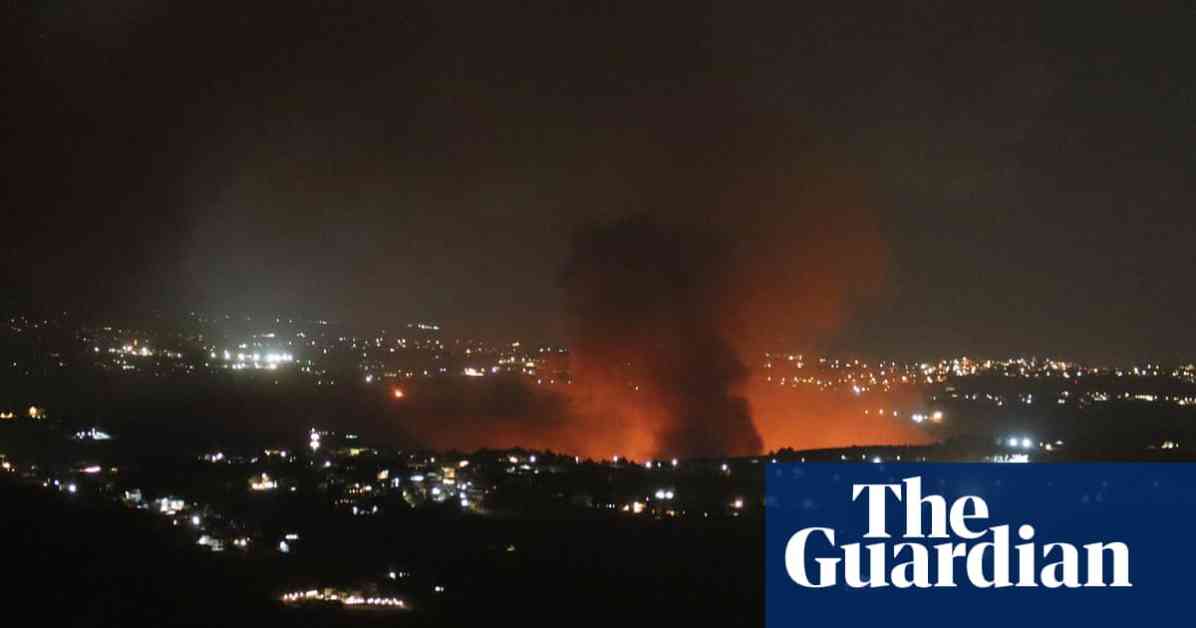Israeli Strikes on Lebanon in Response to Hezbollah’s Deepest Rocket Attacks Since Gaza War
The Israeli military has responded to Hezbollah’s deepest rocket attacks into Israel since the start of the Gaza war with a series of airstrikes on hundreds of targets in southern Lebanon. The Israel Defense Forces (IDF) launched two waves of attacks over the weekend, targeting approximately 290 sites in the first wave and 110 sites in the second wave. This escalation in violence has raised concerns about the possibility of a wider conflict in the region.
Hezbollah’s rocket attacks into Israel prompted sirens to sound in dozens of towns across northern Israel. While most of the rockets were intercepted, about 10 are believed to have crossed over from Lebanon. One man was lightly wounded by shrapnel from a missile that was intercepted in a village in the lower Galilee, according to Israel’s emergency medical services.
In response to what it described as “repeated Israeli attacks on Lebanon,” Hezbollah claimed to have targeted the Israeli Ramat David airbase near Haifa with dozens of missiles. This attack marked the furthest target that the Lebanese group has hit in Israel since the beginning of the conflict in October, approximately 50km from the Lebanon-Israel border.
Israeli Defense Minister’s Response and Recent Developments
Israeli Defense Minister Yoav Gallant delivered a speech at the Ramat David airbase, where he stated that Israel’s war with Hezbollah had entered a “new phase.” He commended the army’s Mossad intelligence agency for its achievements in the region, following a wave of attacks in Lebanon that targeted Hezbollah members. These attacks resulted in the deaths of 42 individuals and left more than 3,000 wounded.
Hezbollah recently released drone footage over the city of Haifa, highlighting the Ramat David airbase as part of a video showcasing military infrastructure in northern Israel. The closure of Israel’s northern airspace on Saturday indicated the country’s readiness for potential retaliation from Hezbollah following the assassination of a top Hezbollah leader in Beirut.
Three children and seven women were among the 37 individuals killed by an Israeli strike on Beirut on Friday. Lebanese authorities have reported that the strike targeted the top Hezbollah leader in a densely populated neighborhood. The United States and United Nations have issued warnings against further escalation, leading several airlines to cancel flights to Beirut out of fear of a full-blown war in the region.
Escalation in Gaza and Strategic Aims
Despite the conflict in the north, Israel has continued its military operations in Gaza. A recent bombing of a school turned shelter resulted in the deaths of at least 22 individuals, predominantly women and children, according to the Gaza health ministry. Israel claimed the target was a Hamas base within the school, but provided no further details or evidence.
Israel announced its expanded strategic aims for the Gaza war, including the return of 60,000 evacuated residents of northern Israel to their homes, which are frequently targeted by Hezbollah. This move was followed by a series of unprecedented attacks on the group, further intensifying the conflict in the region.
The US State Department has advised Americans in Lebanon to depart due to the ongoing conflict between Hezbollah and Israel. Commercial flights are still available, but at reduced capacity, with the potential for further restrictions if the security situation deteriorates. The US raised its travel advisory for Lebanon to its highest level after a strike on southern Beirut killed a Hezbollah commander.
In recent months, Hezbollah has launched attacks in support of its ally Hamas, with the intention of ceasing hostilities once the Gaza Strip offensive ends. The ongoing missile, rocket, and drone strikes have resulted in casualties on both sides, turning Israel’s border regions near Lebanon into a volatile buffer zone.
In conclusion, the situation in the Middle East remains tense as Israel and Hezbollah engage in escalating violence. The international community continues to monitor the developments closely, hoping to prevent further bloodshed and a full-scale war in the region.












